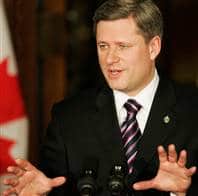Yesterday at a meeting of the Standing Committee on Environment and Sustainable Development, Canada’s Minister of the Environment waffled about heavily and refused to provide a full accounting of the government’s $1.519 billion Canada Eco Trust Fund for Clean Air and Climate Change.
This follows on criticism two weeks ago of the Eco Trust by the government’s Auditor General, Sheila Fraser, who stated:
We are deeply concerned about very large transfers being made purportedly for certain purposes. But when you look at the actual agreements there are absolutely no conditions requiring the recipient to use the moneys for the purposes being announced.”
Lacking the oversight guaranteeing that monies provided to the provinces will be spent appropriately is bad enough, but even worse it appears the government cannot even account for monies spent to date.
Here’s a transcript of the exchange between Minister Baird and the Liberal Environment critic, David McGuinty:
Mr. David McGuinty: Has any money been disbursed?
Hon. John Baird: As much money as the provinces have asked for.
Mr. David McGuinty: Has any money been disbursed of the $1.519 billion?
Hon. John Baird: As much money as the provinces have–
Mr. David McGuinty: How about a straight answer.
Hon. John Baird: That’s the answer I’ve been getting.
Mr. David McGuinty: Can I ask the deputy minister? Has any money, deputy, left the trust fund into provincial hands?
Mr. Ian Shugart (Associate Deputy Minister, Department of the Environment): The way the trust fund mechanism works, Mr. Chair, is that when the trust fund is set up it is out of the hands of the Government of Canada and is drawn down by the provinces. That is essentially a private matter between the individual jurisdiction and the manager, the trustee of the fund.
Mr. David McGuinty: You put over one-and-a-half billion dollars into a fund and you’re telling us you can’t tell us whether any money has been drawn down?
Hon. John Baird: I can tell you that any province that wants the money it’s there.
Mr. David McGuinty: You can’t tell us whether any of the money of the $1.5 billion put into a trust fund has been drawn down. Is that right?
Hon. John Baird: You can ask the question 10 times. I’ve already answered it.
Mr. David McGuinty: So you don’t– For example, are there any firm targets or conditions with respect to a cost to greenhouse gas reduction ratio involving drawing down this money?
Hon. John Baird: One of the things that your premier and my premier has been particularly strong on is that the government of Ontario, my premier says, is not accountable to the federal government. It is accountable directly to the people of Ontario. That was the position of Mr. Martin and it’s certainly our position as well.
Mr. David McGuinty: Are you aware, Minister, of what the Auditor General, Sheila Fraser, said just two weeks ago in reference to your eco trust?
Let me quote what she said from the accountability perspective. She said:
|
We are deeply concerned about very large transfers being made purportedly for certain purposes. But when you look at the actual agreements there are absolutely no conditions requiring the recipient to use the moneys for the purposes being announced |
Can you help us understand what your position is with respect to the Auditor General’s concerns?
Hon. John Baird: The accountability regime– You know, I have a background in the government of Ontario, in the legislative assembly of Ontario as well. I know it best. That’s the riding I also represent. The way federalism has worked in this regard is that the government of Ontario, the provincial government, is not accountable to the federal government, it’s accountable to the legislature and the people of the province of Ontario. In this regard, I can tell you, I have no reason to doubt the integrity and the management of my premier to deal with these funds.
Mr. David McGuinty: Minister, why are public expenditures at the federal level–these are federal taxpayer dollars–why are these considered to be private matters? What’s the point of public accounts and public estimates if our expenditures can be private and you can’t even tell us what’s happened to $1.5 billion?
Hon. John Baird: There’s only one taxpayer, so it’s not the federal taxpayer, a provincial taxpayer or a territorial taxpayer, or a municipal taxpayer. There’s only one taxpayer and each level of government is accountable to the people that collect it. The government’s accounting treatment was acceptable because the government had entered into the agreements with the appropriate authorities, had authorization from Parliament to make the payments to trust with the passing of the budget implementation act before the financial statements were finalized, had not included in the trust agreements or letters to provinces and territories any condition to be eligible to receive these funds that would have been met by the provinces or territories subsequently and that had known the amount to the transfer. This is the way it worked under the previous government, and I think we particularly feel strongly about it, a different kind of federalism, where the provinces do not work for the federal government. They’re elected by people in their jurisdiction and they’re the people with whom they’re counted.
Subscribe to our newsletter
Stay up to date with DeSmog news and alerts






